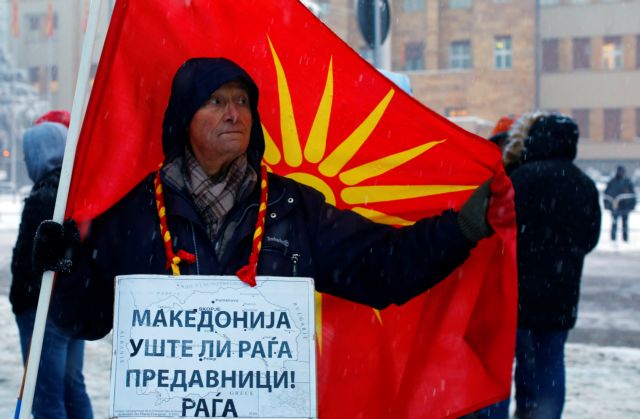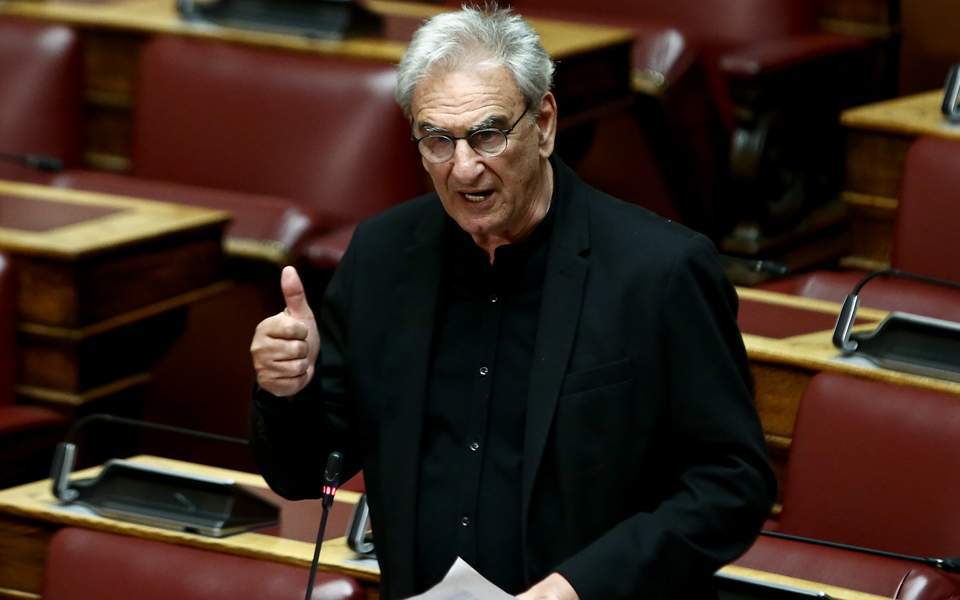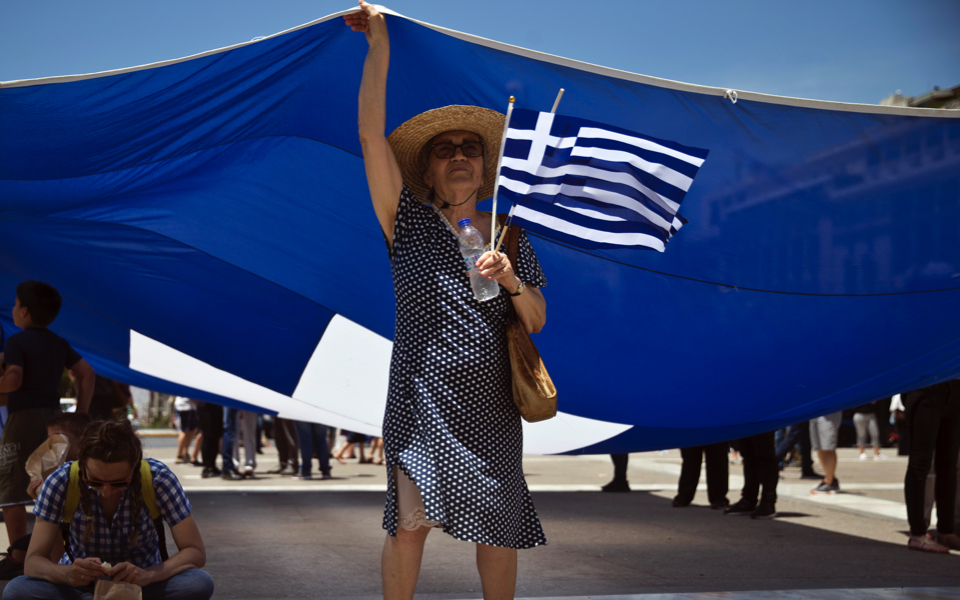1) Amendments to Constitution, clarifications refer indirectly to Macedonian ethnicity
In effect, with the pretext of protecting the rights of veterans the clarification asserts clearly the existence of a Macedonian ethnicity (Macedonian people) and indeed liberation struggles that sought to unify the entire geographic area of Macedonia.
ΤοΒΗΜΑ Team | 18.01.2019
URL:
Amidst virulent recriminations between SYRIZA and main opposition New Democracy in Parliament during debate on the confidence vote on the evening of 16 June, Prime Minister Alexis Tsipras announced that Athens has received from Skopje the requisite Note Verbale that begins the countdown for the ratification of the Prespa Agreement by Greece.
Tsipras maintained that the clarifications of certain constitutional amendments passed by Skopje in accord with the agreement put to rest fears that the agreement recognises a “Macedonian ethnicity”, as New Democracy leader Kyriakos Mitsotakis claims.
“The [foreign] ministry of Macedonia further notes that in accordance with the letter and the spirit of the agreement, it is understood that the term “nationality” of the Second Party defined in Article 1 (3) (b), of the Agreement as “Macedonian/Citizen of the Republic of North Macedonia” refers exclusively to the citizenship and does not define or pre-determine ethnic affiliation/ethnicity”.
The text also notes that “the ‘Macedonian language’ refers to the official language of the Second Party as recognised by the Third UN Conference on the Standardisation of Geographical Names held in Athens in 1977, which is within the group of South Slavic languages.”
The six-page note verbale includes the four amendments to the Constitution (XXXIII, XXXIV, XXXV, XXXVI) that have been agreed to in the Prespa Agreement and key interpretive clarifications.
Name change
The first of the amendments (XXXIII) is crucial as it stipulates that any reference in the Constitution to the “Republic of Macedonia” will be changed to “Republic of North Macedonia”.
However, it exempts and retains the reference to plain Macedonia in Article 36 of the Constitution which refers to the social rights of veterans of the “Anti-Fascist Struggle” and all struggles of the “Macedonian Liberation Wars”, “for war handicapped and all those who were persecuted or jailed for the ideals of a distinct identity of the Macedonian people and Macedonian identity.”
In effect, with the pretext of protecting the rights of veterans the clarification asserts clearly the existence of a Macedonian ethnicity (Macedonian people) and indeed liberation struggles that sought to unify the entire geographic area of Macedonia, including the ancient and largest party which is now part of the Greek state.
Amendment XXXIV amends the Preamble of the Constitution in such a manner as not to depict “the Macedonian people” as above the country’s many ethnic communities – Albanian, Turkish, Vlach, Serbian, Roma, and Bosnian.
There is a citation of the decisions of the Anti-fascist Assembly for the National Liberation of Macedonia, the underpinning of which was the concept of Macedonian ethnicity and a yearning for the acquisition of Aegean Macedonia, the largest part which is in Greece.
It describes the legal decisions referring to the declaration of the first Assembly to the people of Macedonia.
A reference to those who expressed the will to create and independent sovereign state will be added.
Effectively, by referring to the legal decisions of the Assembly, Skopje is suggesting that the amendment refers only to the establishment of the Republic and not to the irredentist claims to what the Macedonians historically described as “Macedonia of the Aegean”.
Ohrid Agreement, Albanians’ rights
So too there is a reference to the Ohrid Agreement which recognised Albanian as an official language, laid the groundwork for recognising over a dozen basic rights of the Albanian minority, and stopped a budding civil war, with the attacks of the well-armed Albanian National Liberation Army (NLA), which was about to tear the country apart.
Another key amendment (XXXV) strengthens the denunciation of traditional irredentism with the declaration that Skopje respects the sovereignty, territorial integrity and political independence of neighbouring countries.
That replaces the current more restrictive declaration that Skopje simply has no territorial claims vis a vis neighbouring countries.
Diaspora
A change that is particularly important as regards potential claims of the existence of a “Macedonian minority” in neighbouring countries is amendment XXXVI. It clarifies that in expressing concern for the status of individuals belonging to the “Macedonian people” in neighbouring countries and the diaspora Skopje will not meddle in the internal affairs or sovereign rights of these neighbours.
It would appear, however, that the reference to the “Macedonian people” abroad constitutes recognition of a “Macedonian” ethnicity.
Amendment XXXVI reads as follows.
“The Republic shall respect, guarantee and foster the characteristics and the historical and cultural heritage of the Macedonian people. The Republic shall protect the rights and interests of its nationals living or staying abroad. The Republic shall provide for the diaspora of the Macedonian people and of part of the Albanian people, Turkish people, Vlach people, Serbian people, Roma people, Bosniak people and others and shall foster and promote the ties with the fatherland in doing so. In doing so, the Republic shall not interfere with the sovereign rights of other states and with their internal affairs.”
The fact that the six groups to be protected are referred to by their ethnicity and not as “Macedonians” makes it perfectly clear that the phrase “Macedonian people” refers directly to ethnicity.
2) Potami MP Lykoudis confirms he will back Prespa name deal
URL:
Spyros Lykoudis, a lawmaker from centrist party To Potami, confirmed, as expected, that he will back the deal signed between Athens and Skopje when it comes to Parliament for ratification.
“We have said from the beginning that the agreement has a positive main pillar because it fulfils the decades-old national effort for Macedonia to adopt a composite name erga omnes,” the political movement headed by Lykoudis, the “Reformists of the Left” said in a statement on Friday.
“We are today before an important and a chronic problem of our foreign policy whose perpetuation has always worked against us. This loose end must come to an end. Our country's position in the big European family and the leading role it can play in the region require the solution of the problem,” it added.
Ruling SYRIZA has 145 deputies, and can count on the positive votes of Deputy Citizens’ Protection Minister Katerina Papacosta, four ANEL deputies, Tourism Minister Elena Kountoura, Deputy Agriculture Minister Vassilis Kokkalis, Thanassis Papachristopoulos and Costas Zouraris and To Potami leader Stavros Theodorakis, and party MP Spyros Danellis, Spyros Lykoudis and Giorgos Mavrotas, we end up again with an even wider majority in the 300-member Parliament.
There might be one more, that of Democratic Left chief Thanasis Theocharopoulos.
In effect, with the pretext of protecting the rights of veterans the clarification asserts clearly the existence of a Macedonian ethnicity (Macedonian people) and indeed liberation struggles that sought to unify the entire geographic area of Macedonia.
ΤοΒΗΜΑ Team | 18.01.2019
URL:
Amidst virulent recriminations between SYRIZA and main opposition New Democracy in Parliament during debate on the confidence vote on the evening of 16 June, Prime Minister Alexis Tsipras announced that Athens has received from Skopje the requisite Note Verbale that begins the countdown for the ratification of the Prespa Agreement by Greece.
Tsipras maintained that the clarifications of certain constitutional amendments passed by Skopje in accord with the agreement put to rest fears that the agreement recognises a “Macedonian ethnicity”, as New Democracy leader Kyriakos Mitsotakis claims.
“The [foreign] ministry of Macedonia further notes that in accordance with the letter and the spirit of the agreement, it is understood that the term “nationality” of the Second Party defined in Article 1 (3) (b), of the Agreement as “Macedonian/Citizen of the Republic of North Macedonia” refers exclusively to the citizenship and does not define or pre-determine ethnic affiliation/ethnicity”.
The text also notes that “the ‘Macedonian language’ refers to the official language of the Second Party as recognised by the Third UN Conference on the Standardisation of Geographical Names held in Athens in 1977, which is within the group of South Slavic languages.”
The six-page note verbale includes the four amendments to the Constitution (XXXIII, XXXIV, XXXV, XXXVI) that have been agreed to in the Prespa Agreement and key interpretive clarifications.
Name change
The first of the amendments (XXXIII) is crucial as it stipulates that any reference in the Constitution to the “Republic of Macedonia” will be changed to “Republic of North Macedonia”.
However, it exempts and retains the reference to plain Macedonia in Article 36 of the Constitution which refers to the social rights of veterans of the “Anti-Fascist Struggle” and all struggles of the “Macedonian Liberation Wars”, “for war handicapped and all those who were persecuted or jailed for the ideals of a distinct identity of the Macedonian people and Macedonian identity.”
In effect, with the pretext of protecting the rights of veterans the clarification asserts clearly the existence of a Macedonian ethnicity (Macedonian people) and indeed liberation struggles that sought to unify the entire geographic area of Macedonia, including the ancient and largest party which is now part of the Greek state.
Amendment XXXIV amends the Preamble of the Constitution in such a manner as not to depict “the Macedonian people” as above the country’s many ethnic communities – Albanian, Turkish, Vlach, Serbian, Roma, and Bosnian.
There is a citation of the decisions of the Anti-fascist Assembly for the National Liberation of Macedonia, the underpinning of which was the concept of Macedonian ethnicity and a yearning for the acquisition of Aegean Macedonia, the largest part which is in Greece.
It describes the legal decisions referring to the declaration of the first Assembly to the people of Macedonia.
A reference to those who expressed the will to create and independent sovereign state will be added.
Effectively, by referring to the legal decisions of the Assembly, Skopje is suggesting that the amendment refers only to the establishment of the Republic and not to the irredentist claims to what the Macedonians historically described as “Macedonia of the Aegean”.
Ohrid Agreement, Albanians’ rights
So too there is a reference to the Ohrid Agreement which recognised Albanian as an official language, laid the groundwork for recognising over a dozen basic rights of the Albanian minority, and stopped a budding civil war, with the attacks of the well-armed Albanian National Liberation Army (NLA), which was about to tear the country apart.
Another key amendment (XXXV) strengthens the denunciation of traditional irredentism with the declaration that Skopje respects the sovereignty, territorial integrity and political independence of neighbouring countries.
That replaces the current more restrictive declaration that Skopje simply has no territorial claims vis a vis neighbouring countries.
Diaspora
A change that is particularly important as regards potential claims of the existence of a “Macedonian minority” in neighbouring countries is amendment XXXVI. It clarifies that in expressing concern for the status of individuals belonging to the “Macedonian people” in neighbouring countries and the diaspora Skopje will not meddle in the internal affairs or sovereign rights of these neighbours.
It would appear, however, that the reference to the “Macedonian people” abroad constitutes recognition of a “Macedonian” ethnicity.
Amendment XXXVI reads as follows.
“The Republic shall respect, guarantee and foster the characteristics and the historical and cultural heritage of the Macedonian people. The Republic shall protect the rights and interests of its nationals living or staying abroad. The Republic shall provide for the diaspora of the Macedonian people and of part of the Albanian people, Turkish people, Vlach people, Serbian people, Roma people, Bosniak people and others and shall foster and promote the ties with the fatherland in doing so. In doing so, the Republic shall not interfere with the sovereign rights of other states and with their internal affairs.”
The fact that the six groups to be protected are referred to by their ethnicity and not as “Macedonians” makes it perfectly clear that the phrase “Macedonian people” refers directly to ethnicity.
2) Potami MP Lykoudis confirms he will back Prespa name deal
URL:
Spyros Lykoudis, a lawmaker from centrist party To Potami, confirmed, as expected, that he will back the deal signed between Athens and Skopje when it comes to Parliament for ratification.
“We have said from the beginning that the agreement has a positive main pillar because it fulfils the decades-old national effort for Macedonia to adopt a composite name erga omnes,” the political movement headed by Lykoudis, the “Reformists of the Left” said in a statement on Friday.
“We are today before an important and a chronic problem of our foreign policy whose perpetuation has always worked against us. This loose end must come to an end. Our country's position in the big European family and the leading role it can play in the region require the solution of the problem,” it added.
Ruling SYRIZA has 145 deputies, and can count on the positive votes of Deputy Citizens’ Protection Minister Katerina Papacosta, four ANEL deputies, Tourism Minister Elena Kountoura, Deputy Agriculture Minister Vassilis Kokkalis, Thanassis Papachristopoulos and Costas Zouraris and To Potami leader Stavros Theodorakis, and party MP Spyros Danellis, Spyros Lykoudis and Giorgos Mavrotas, we end up again with an even wider majority in the 300-member Parliament.
There might be one more, that of Democratic Left chief Thanasis Theocharopoulos.















Comment